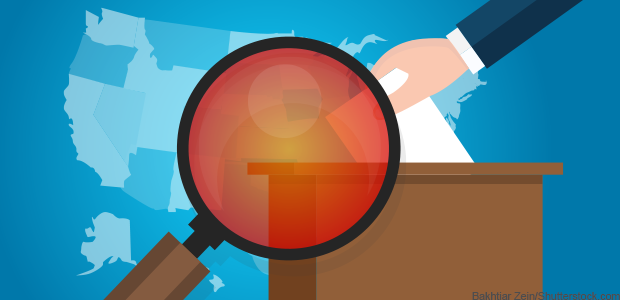ODNI official promises more sharing ahead of 2020 elections
The top intelligence official charged with election security said agencies have evolved to more quickly declassify and share information, but the threat landscape is more muddled this time around.

The top official charged with coordinating election security efforts across the intelligence community said officials will work harder to quickly declassify and share information about ongoing threats to election infrastructure with state officials and other stakeholders. However, the careful balancing act between spreading awareness and protecting sources and methods will still likely result in frustrations from stakeholders.
In a Jan. 14 speech, Shelby Pierson of the Office of the Director of National Intelligence said attacks on voting infrastructure, political campaign hacks and malign influence operations will be more sophisticated in 2020 but must be treated as components in a larger batch of activities used by adversarial nations that do not end after voters have cast their ballots.
"We certainly recognize that election security is but a moment in time across a pretty consistent threat of malign influence that might focus on the particular election event, but there are many, many other activities and vectors that our adversaries use to pursue us when it's not election day," Pierson said while speaking at an event hosted by the Election Assistance Commission.
Pierson said the 2016 presidential elections represented a watershed moment for the intelligence community. While the government has conducted counterintelligence work for decades, 2016 was "a moment in time in which the intelligence community had very valuable information about the threats that we were facing and the activity that was being undertaken."
Some of that information did come out before election day in 2016, but many state officials complained that the federal government was too slow to notify them of the impending threat from Russian hackers and too secretive when it finally did.
When it comes to the 2020 elections, Russia, China, Iran and other actors have the capabilities and motivation to meddle, and Pierson said she was "committed" to downgrading classification and sharing more information where possible with stakeholders this time around. However, that balancing act between speedy dissemination and protecting sources and methods will remain, and the process will "inevitably leave certain parties unsatisfied."
"I face the criticism that sometimes there's some latency built into that process, that there's potentially a lack of context and specificity to that information and those are all criticisms and challenges that I take fully on board," Pierson said.
Pierson was named to the newly-created Election Threats Executive position last year in one of Director of National Intelligence Dan Coats' final decisions before he resigned. She's not alone, with similar positions sprouting up at multiple federal agencies since 2016, including the Department of Homeland Security, National Security Agency, Central Intelligence Agency and FBI.
One reason: to instill more accountability for what has become a top policy issue for Congress and the national security community.
"I think we had momentum across the disciplines that are so critical to this topic, and yet we recognize that having individuals like myself across the intelligence community who are held accountable for integrating those disciplines…would be another step forward," she said.
Pierson listed a number of responsibilities that now fall under her purview, including developing new means to access the systems and infrastructure of foreign adversaries, conducting analysis to inform policymaking, "personally shepherding" improvements in the security clearance process and enabling cyber operations against actors and groups seeking to meddle in U.S. elections.
One area where intelligence agencies could play a unique role is leveraging their awareness of ongoing influence campaigns and notifying targeted groups, individuals, political candidates and parties, or states and counties. Victims of such campaigns are not automatically notified by the government the way they are for hacks and other cybersecurity incidents. It's "another policy opportunity where we can share information and have already done so," said Pierson.
NEXT STORY: Quick Hits





